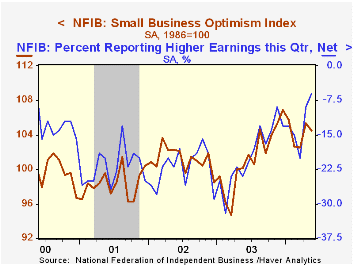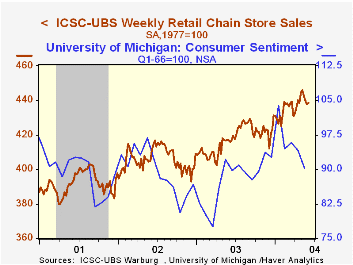 Global| Jun 08 2004
Global| Jun 08 2004Small Business Optimism Slipped
by:Tom Moeller
|in:Economy in Brief
Summary
The Small Business Optimism Index published by the National Federation of Independent Business (NFIB) slipped 0.9% last month following a 2.8% jump in April. The decline reflected fewer firms expecting the economy to improve as well [...]

The Small Business Optimism Index published by the National Federation of Independent Business (NFIB) slipped 0.9% last month following a 2.8% jump in April.
The decline reflected fewer firms expecting the economy to improve as well as a slight decline in the percent of firms planning to raise employment and capital expenditures.
Nevertheless, the percentage of firms raising average selling prices rose and the percent reporting higher earnings this quarter improved.
During the last ten years there has been a 50% correlation between the level of the NFIB index and the y/y change in real GDP.
About 24 million businesses exist in the United States. Small business creates 80% of all new jobs in America.
| Nat'l Federation of Independent Business | May | April | Y/Y | 2003 | 2002 | 2001 |
|---|---|---|---|---|---|---|
| Small Business Optimism Index (1986=100) | 104.5 | 105.4 | 4.4% | 101.3 | 101.2 | 98.4 |
by Tom Moeller June 8, 2004

Chain store sales inched 0.2% higher last week following three successive down periods, according to the International Council of Shopping Centers (ICSC)-UBS.
Sales in early June started 0.7% below the May average.
During the last ten years there has been a 59% correlation between y/y change in chain store sales and the change in non-auto retail sales less gasoline.
The ICSC-UBS retail chain-store sales index is constructed using the same-store sales reported by 78 stores of seven retailers: Dayton Hudson, Federated, Kmart, May, J.C. Penney, Sears and Wal-Mart.
| ICSC-UBS (SA, 1977=100) | 06/05/04 | 05/29/04 | Y/Y | 2003 | 2002 | 2001 |
|---|---|---|---|---|---|---|
| Total Weekly Retail Chain Store Sales | 438.5 | 437.7 | 5.5% | 2.9% | 3.6% | 2.1% |
by Tom Moeller June 9, 2004

"Economic developments going forward will determine the level and term structure of interest rates. Federal funds futures prices already reflect expectations of a substantial firming of policy by the Federal Open Market Committee (FOMC). Unlike 1994, there has been an appreciable increase of market rates in anticipation of policy tightening, though history cautions that investors' anticipations of the cumulative magnitude of policy actions and their timing under such circumstances are far from perfect." - Alan Greenspan
The complete text of Chairman Greenspan's June 8th comments on economic developments can be found here.
"Great Expectations: The Role of Beliefs in Economics and Monetary Policy" from Federal Reserve Bank of Philadelphia President Santomero is available here.
Tom Moeller
AuthorMore in Author Profile »Prior to joining Haver Analytics in 2000, Mr. Moeller worked as the Economist at Chancellor Capital Management from 1985 to 1999. There, he developed comprehensive economic forecasts and interpreted economic data for equity and fixed income portfolio managers. Also at Chancellor, Mr. Moeller worked as an equity analyst and was responsible for researching and rating companies in the economically sensitive automobile and housing industries for investment in Chancellor’s equity portfolio. Prior to joining Chancellor, Mr. Moeller was an Economist at Citibank from 1979 to 1984. He also analyzed pricing behavior in the metals industry for the Council on Wage and Price Stability in Washington, D.C. In 1999, Mr. Moeller received the award for most accurate forecast from the Forecasters' Club of New York. From 1990 to 1992 he was President of the New York Association for Business Economists. Mr. Moeller earned an M.B.A. in Finance from Fordham University, where he graduated in 1987. He holds a Bachelor of Arts in Economics from George Washington University.
More Economy in Brief
 Global| Feb 05 2026
Global| Feb 05 2026Charts of the Week: Balanced Policy, Resilient Data and AI Narratives
by:Andrew Cates






